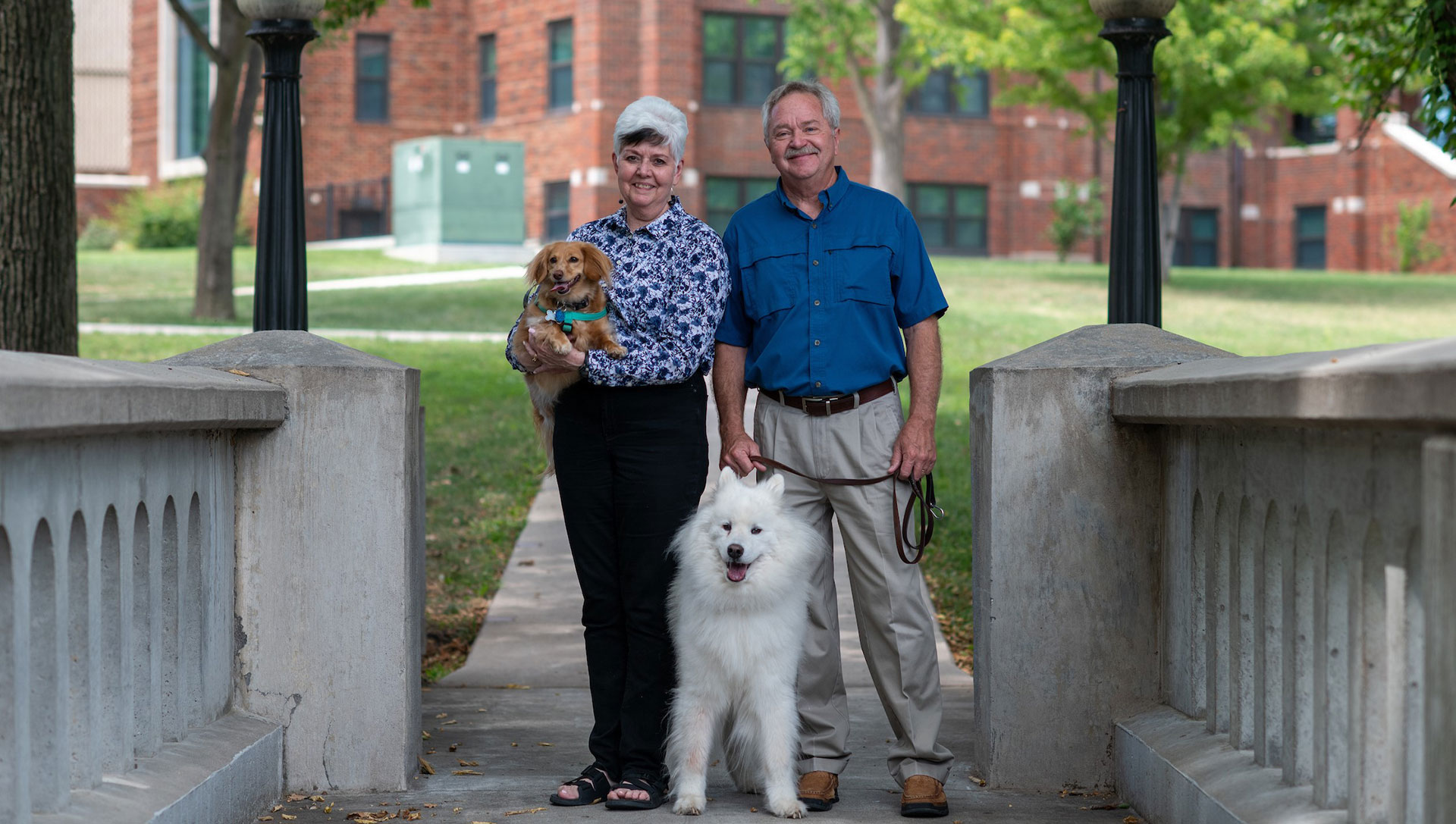Gift Planning
Planned Giving
Find out what types of assets make the best planned gifts. Learn about gifts of cash, securities and property.
Bob and Mary Are Giving Smarter and Achieving Their Dreams...Find Out How You Can Too!

Bob and Mary first met at Two-Bit Flicks, a 25-cent movie night held on Fridays in Brighton Lecture Hall. When the spring formal hosted by the women's dorm came around, Mary asked Bob to go with her. It was their first "official" date.
The rest, as the saying goes, is history. Or in Bob and Mary's case, it is natural history. That's because Emporia State also introduced them to a lifelong passion for the natural sciences.
Bob and Mary feel Emporia State was the catalyst for the life they've built together. Mary became a science educator for 6th, 7th, 8th and 9th grade students. Bob founded and served as director of the Great Plains Nature Center and became a renowned nature photographer.
Now they want others to have the same opportunity they did. They want to help students come to ESU and discover a passion they can follow for the rest of their lives.
Bob and Mary found a simple and easy way to achieve this dream. When they set up their trust, they named Emporia State as a beneficiary.
What's your dream?
Learn how easy it is to make your dream a reality by naming Emporia State University in your will or trust. Contact Angela Fullen, Director of Planned Giving at the Emporia State University Foundation. She can answer your questions or help you get started. If you have already named Emporia State in your will or trust, let us know. We will make sure your gift does everything you want it to do.
"I would encourage anyone, if they are thinking about doing something like this, to contact the Foundation. For us, it has been a great experience." - Mary Butel
Getting Started is Easy
Not sure how to take the first step? We've got just the thing you need. Download your free Will and Estate Planning Guide. This guide is an easy way to get started on, or update, your estate plan. It will help you explore your options at your own pace. It's free, easy and yours to keep.
Download your copy today or contact Angela Fullen to request a printed copy.

Angela Fullen
Director of Planned Giving
Telephone: 620-341-6465
[email protected]
Savvy Living

Navigating Prescription Expenses
There is a low-income subsidy program called ‘Extra Help’ that assists Medicare beneficiaries by paying their monthly premiums, annual deductibles and co-payments related to their Medicare (Part D) prescription drug coverage.
The Inflation Reduction Act that was signed into law in late 2022 expanded coverage and benefits under Extra Help beginning in January 2024. It is important to check the new eligibility requirements and apply for coverage if you have not been automatically enrolled.
The Extra Help benefit is estimated to be worth about $5,300 per year. Currently, about 13 million people are enrolled in the program. However, it is estimated that approximately 3 million more Medicare beneficiaries may qualify for Extra Help under the new guidelines.
The amount of financial assistance available under the program depends on income and assets. If you qualify, and unless you receive a partial subsidy, you will pay no premium or deductible, and no more than $4.50 for each generic drug or $11.20 for each brand-name drug your plan covers in 2024.
To be eligible for Extra Help, a Medicare beneficiaries’ assets must be limited to $17,220 for individuals or $34,360 for married couples. Bank accounts, stocks, bonds, mutual funds and IRAs count as assets, but homes, vehicles, personal belongings, life insurance and burial plots are not included in the calculation.
There are also income guidelines that must be met to qualify. Under those limits, annual income may not exceed $22,590 for an individual or $30,660 for married couples. A beneficiary with higher income may still qualify if they support a family member who lives with them or lives in Alaska or Hawaii. In addition, cash payments received from government programs for household expenses such as food, rent, mortgage payments, utilities and property taxes will not count towards income.
How to Apply
There are three ways to apply for Extra Help. You can apply online at SSA.gov/medicare/part-d-extra-help, over the phone by calling 800-772-1213 or in person at your local Social Security office.
The application form requires your Social Security number and information about your bank balances, pensions and investments. Social Security will review your application and send a letter within a few weeks letting you know whether you qualify.
If you do not qualify for Extra Help, you may still get help from a state pharmacy assistance program or a patient assistance program. Visit NeedyMeds.org to search for these programs.
Other Medicare Assistance
If you are eligible for Extra Help, you may also qualify for assistance on your Medicare expenses through your state’s Medicare Savings Program.
State Medicaid programs partner with the federal government, resulting in income and asset qualifications that differ based on where you live. Medicare Savings Programs will pay the entire Medicare Part B premium each month. In some cases, they may also cover your Medicare deductibles, coinsurance and copayments, depending on your income level. Income and asset qualifications vary depending on your state. To determine eligibility, contact your state Medicaid office.
You can also receive help through your State Health Insurance Assistance Program (SHIP), which provides free Medicare counseling in person or over the phone. Visit ShipHelp.org or call 877-839-2675 to locate a counselor in your area.
Savvy Living is written by Jim Miller, a regular contributor to the NBC Today Show and author of "The Savvy Living" book. Any links in this article are offered as a service and there is no endorsement of any product. These articles are offered as a helpful and informative service to our friends and may not always reflect this organization's official position on some topics. Jim invites you to send your senior questions to: Savvy Living, P.O. Box 5443, Norman, OK 73070.
Previous Articles
Dividing Personal Possessions Without Dividing the Family
Does Medicare Cover Weight-Loss Treatments?


